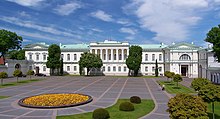President of the Republic of Lithuania
| President of the Republic of Lithuania | |

|
|
| Standard of the President | |

|
|
|
Acting President Gitanas Nausėda since July 12, 2019 |
|
| Official seat | Presidential Palace in Vilnius |
| Term of office | 5 years (re-election possible once) |
| Creation of office | April 4, 1919 |
| Last choice | May 26, 2019 |
| website | www.president.lt |
The President of the Republic of Lithuania ( Lithuanian : Lietuvos Respublikos Prezidentas ) is the head of state of the Baltic State of Lithuania . He resides in the Presidential Palace in Vilnius . The acting president is Gitanas Nausėda .
Constitutional position
According to the current 1992 constitution , the president is the head of state. He represents the Lithuanian state and does everything that is assigned to him by the constitution and the law.
Competencies and tasks
The tasks and powers of the President are set out in Article 84 of the Constitution . The President's duties include:
- He decides on the fundamental issues of foreign policy and, together with the government 's foreign policy by
- signs the international treaties of the Republic of Lithuania and submits them to the Seimas for ratification
- appoints the Prime Minister with the approval of the Seimas , instructs him to form a government and confirms its composition
- dismisses the prime minister with the approval of the Seima
- takes over government powers that have fallen back after a new Seimas is elected and instructs them to continue in office until a new government is formed
- appoints and dismisses ministers on the proposal of the Prime Minister
- appoints and dismisses certain public officials in accordance with the procedure established by law
- appoints and dismisses the commander of the armed forces and the head of the security office with the approval of the Seimas
- bestows the highest military ranks
- In the event of an armed attack threatening the sovereignty or territorial integrity of the state, makes decisions on defense against armed aggression, on establishing a state of war and on mobilization, and submits these decisions to the Seimas for confirmation at its next meeting
- convenes an extraordinary meeting of the Seimas in the cases provided for by the Constitution
- retrieves the regular elections Seimas and, as provided for in the second paragraph of the article 58 cases, premature elections Seimas from
- bestows the state awards
- grants pardons for convicts
- Signs and promulgates laws passed by the Seimas or remits them to the Seimas in accordance with the procedure set out in Article 71 of the Constitution
choice
According to the constitution, elections for the President of the Republic are held on the last Sunday two months before the end of the term of office of the incumbent president.
The President is in direct elections for five years in the constituencies in a secret ballot elected. The basis of the election is the universal, equal and immediate right to vote. The same person cannot be elected more than twice in a row (Art. 78).
A citizen of Lithuanian origin who has lived in Lithuania for no less than the last three years can be elected if he has reached at least the age of forty by the day of the election and could be elected a member of the Seimas. To be successfully registered as a candidate, the candidate must collect signatures from at least 20,000 eligible voters. The number of candidates is not limited.
The candidate is deemed to have been elected if, in the first round of voting, no less than half of all eligible voters participated, and received more than half of the votes of all voters participating in the election. If less than half of all eligible voters took part in the election, the candidate who has received most, but not less than one third of the votes of all eligible voters, is considered elected. If none of the candidates achieved the required majority in the first ballot, a new vote will be carried out after two weeks on the two candidates who received the most votes. The candidate who receives more votes is considered elected. If no more than two candidates took part in the first ballot and none of them achieved the required number of votes, the election will be repeated.
- Presidential election
- Lithuanian presidential election 1992
- 1997 Lithuanian presidential election
- Lithuanian presidential election in 2002
- 2004 presidential election in Lithuania
- Presidential election in Lithuania 2009
- 2014 Lithuanian presidential election
- Presidential election in Lithuania 2019
Taking office and swearing in
The elected President begins performing his official duties on the day following the expiry of the previous President's term of office. When taking office in Vilnius, in the presence of the people's representatives (members of the Seimas), he must swear to the people to be loyal to the Republic of Lithuania and the constitution, to perform his official duties conscientiously and to be equal and fair to everyone. A re-elected president also swears this.
Term of office
The regular term of office of a president is five years.
During his term of office, the President may not be a Member of Parliament, exercise any other office or receive any payments other than the remuneration and remuneration for creative activities fixed for him. In addition, he must cease his activities in political parties and political organizations until the start of the new election campaign for presidential elections.
Immunity and impeachment
The person of the President of the Republic is inviolable. While he is in office, he cannot be arrested or held criminally responsible.
The president can only be prematurely removed from office if he has seriously violated the constitution or broken his oath, or if it is revealed that a crime has been committed. The question of dismissal from office is decided by parliament in the indictment proceedings. Such impeachment proceedings were carried out in 2004 against the then incumbent Rolandas Paksas .
vacancy
If the incumbent president has died, resigned, has been dismissed from his office on indictment proceedings, or if Parliament has decided that the state of health of the president prevents him from exercising his office, the president of parliament temporarily holds his office. In this case, the President of Parliament loses his powers in Parliament, where his deputy temporarily holds the office. In the cases listed, parliament has to call presidential elections within ten days, which have to be held within a further two months. If parliament is unable to meet or call elections, the government calls the elections.
If the President is temporarily traveling abroad or falls ill and cannot therefore exercise his office, the President of Parliament will represent him for this period.
While the Speaker of Parliament is representing the President, he may not call early parliamentary elections or dismiss or appoint ministers without the consent of Parliament . During this period, Parliament cannot negotiate on matters of suspicion against the Speaker of Parliament.
See also
Web links
- Official website of the President of the Republic of Lithuania (Lithuanian, English, French, Russian)
- German language edition of the constitution of the Republic of Lithuania from 1992 www.verfassungen.eu
